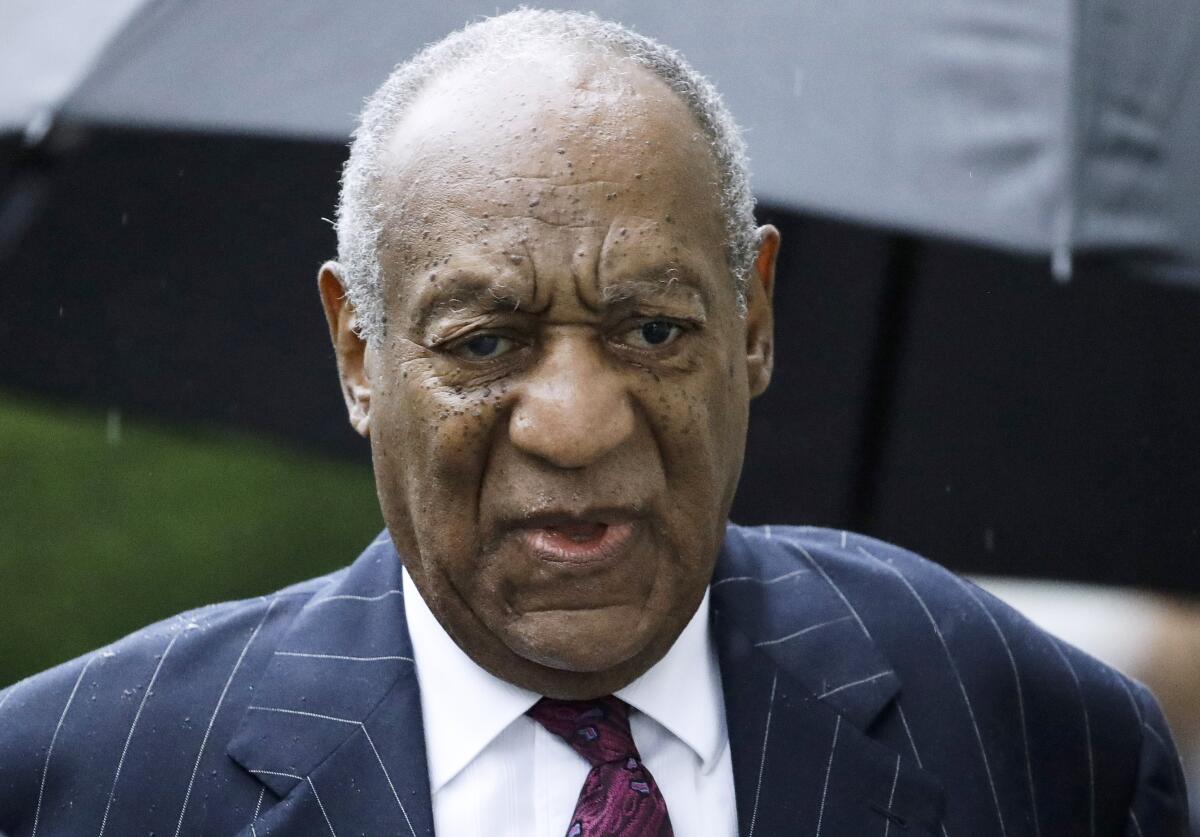Op-Ed: The Pennsylvania court got it right in overturning Bill Cosbyâs conviction

The Pennsylvania Supreme Courtâs decision reversing Bill Cosbyâs conviction reminds us that even those who commit despicable crimes are protected by the Constitution. The Pennsylvania courtâs ruling is disturbing in allowing Cosby to go free notwithstanding his sexual assault convictions, but it is correct in applying a crucial constitutional right: the privilege against self-incrimination found in the 5th Amendment.
In 2018, Cosby was sentenced to three to 10 years in a state prison for drugging and sexually assaulting Andrea Constand at his home in 2004. This is one of a number of instances in which Cosby was accused of drugging and raping women over many years. The evidence against Cosby included statements that he had made in depositions in civil cases against him.
The constitutional problem is that Cosby gave those depositions based on an assurance, in 2005, from then-Dist. Atty. Bruce Castor that he would not be criminally prosecuted for sexual assault.
When a deposition is taken in a civil case, the right against self-incrimination allows a witness to refuse to answer any questions that might lead to criminal liability. But if there is no possibility of a criminal prosecution, then an individual cannot invoke the 5th Amendment and must answer questions.
For example, the 5th Amendment privilege does not apply if a witness is granted immunity from prosecution. In that kind of situation, the statements cannot lead to criminal liability, so there is no right to refuse to answer questions.
The crucial question in the Cosby case is whether he had been promised that he would not be prosecuted before answering questions at the civil depositions. There need not be a formal immunity agreement or a promise in writing. If a prosecutor causes a person to reasonably believe that there is no chance of a criminal prosecution, any statements that are subsequently obtained must be excluded from being used as evidence.
This is essential to protecting the fundamental right of not having to incriminate oneself. It would also be unfair to use statements gained in reliance on a promise not to prosecute.
The Pennsylvania Supreme Court found that the evidence was clear that Dist. Atty. Castor assured Cosby that he would not be criminally prosecuted. As the court noted, that is why Cosby did not invoke his 5th Amendment privilege against self-incrimination when his depositions were taken. The court explained: âCosby did not invoke the Fifth Amendment before he incriminated himself because he was operating under the reasonable belief that D.A. Castorâs decision not to prosecute him meant that the potential exposure to criminal punishment no longer exist[ed].â
In coming to this conclusion, the court relied on a basic and well-established principle of law. As the justices stated: â[W]hen a prosecutor makes an unconditional promise of non-prosecution, and when the defendant relies upon that guarantee to the detriment of his constitutional right not to testify, the principle of fundamental fairness that undergirds due process of law in our criminal justice system demands that the promise be enforced.â
Not a word in the courtâs decision exonerates Cosby of his crimes. The court did not question his guilt in any way. But the Constitution must be followed even when it means that guilty people go free.
It is easy in hindsight to question Castorâs decision in 2005 not to prosecute Cosby because of what he considered evidentiary difficulties in obtaining a conviction. Of course, had Castor not made that decision, Cosby would not have had to answer questions at his deposition, and perhaps without that testimony he would not have been convicted in his 2018 trial.
Perhaps, because of the #MeToo movement and the revelations of sexual assaults by prominent figures, especially in the entertainment industry, a prosecutor would come to a very different assessment today. But the unique facts of the Cosby case do not in any way reduce the ability of police and prosecutors to seek justice and accountability when famous people are accused of rape.
In this case, the Pennsylvania Supreme Court had to determine only whether a promise had been made to Cosby that he would not be criminally prosecuted â a promise upon which he relied. Once the court found that there had been such a promise, it had no choice but to enforce the Constitution and overturn the conviction.
There is a cost to having a Constitution that protects the guilty as well as the innocent. But it is the only way that all of our rights can be secured from abuses by the government.
Erwin Chemerinsky is dean of the UC Berkeley School of Law and a contributing writer to Opinion. He is the author of a forthcoming book, âPresumed Guilty: How the Supreme Court Empowered the Police and Subverted Civil Rights.â
More to Read
A cure for the common opinion
Get thought-provoking perspectives with our weekly newsletter.
You may occasionally receive promotional content from the Los Angeles Times.










